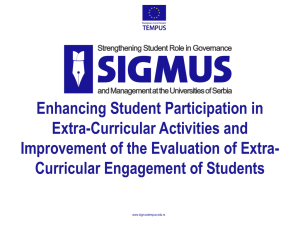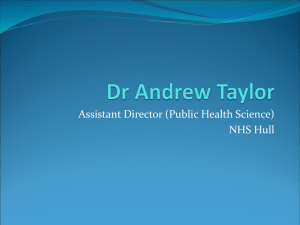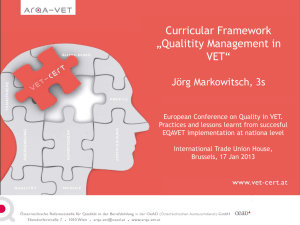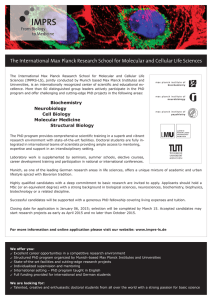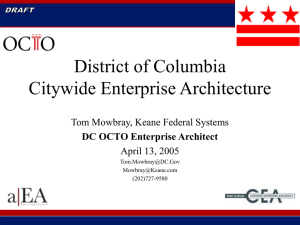Bianchi PPT 260914
advertisement
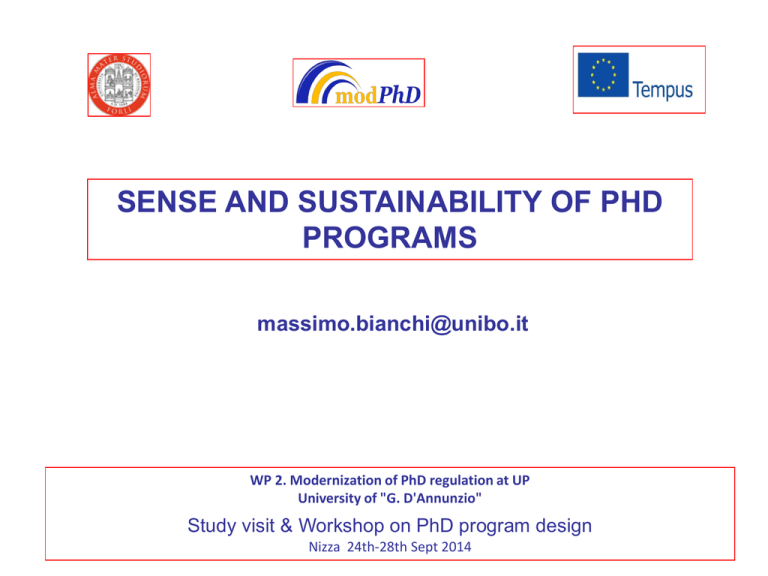
SENSE AND SUSTAINABILITY OF PHD PROGRAMS massimo.bianchi@unibo.it WP 2. Modernization of PhD regulation at UP University of "G. D'Annunzio" Study visit & Workshop on PhD program design Nizza 24th-28th Sept 2014 Main Topics • Elective and seminar courses : The sense of PHD Programs – Teaching methodology – Student assessment methodology • The process of creating and maintaning in a renewal perspective the PhD programs – – – – • Syllabi Teaching material Co-teaching Co-mentoring Beyond the Horizon of Tempus Projects, – The sustainability of PhD programs. Presentation of the Book “ Beyond of the Horizon of Tempus Projects.. Theory and practice of Project Management “. Why Philosophy ? In in the early 19th century , the Humbolt University Arts faculty of Berlin , as in Germany was named the faculty of philosophy, demanded to best students a research contribution, attested by a dissertation, for the award of their final degree, the Doctor of Philosophy (Ph.D.) Strategical topics: •Innovative approach to problems •Personal contribution •Defending thesis in an academic arena THIRD CYCLE STUDIES Typologies • Research • Professional Demand of competencies from the market ( estimation ) 1/5 Research 4/5 Professional ? • Doctorate 2-3 years at national level • PHD 3 - 5 years with international teachers team. Although students aim to finish in Year 3, realistically most students submit their thesis in year 4. Most Universities do not normally allow an extension beyond Year 4. • Full time ( Most research PHDs ) • Part time ( Most professional PHDs ) The external dimension : The PHD performance as a whole Selection at the entrance / at the PHD End Rate of PHD Employm ent / Publichin g level / peer review EFFICIENCY Students Evaluation EFFECTIVENESS Teachers Evaluation ADEQUACY Third Part Evaluation Teachers enrolmen t; n. Of modules in each course. The Structure of a PHD AND Connected Q.A. Activities First Year Second Year Third Year Q.A. Focus Compulsory Courses Teachers / Students Quest. % of attendante Stud. Evaluation Elective Courses Teachers / Students Quest. % of attendance Menthor ev. Stud. Evaluation Research experiences Researches undertook Menthor ev. Peer review Publishing n. and quality of publishing Dissertation of Original Research PHD Committee Peer Review Activities and endorsments in progress The PHD as the be the best HEI Expression of the Learning process. First Year Second Year Activities Q.A. Focus Compulsory Courses Teachers / Students Quest. % of attendante Stud. Evaluation Elective Courses Teachers / Students Quest. % of attendance Menthor ev. Stud. Evaluation Research experiences Researches undertook Menthor ev. Peer review Publishing n. and quality of publishing The structure of a PHD (1) Compulsory courses First Semester ESMP 3101 Entrepreneurship and SME Management 15 ECTS ESMP 3102 Research Methodology for Social Sciences 8 ECTS ESMP 3103 Research Techniques in Social Sciences 7 ECTS Elective courses – 3 out of 6 are elected by the candidate Second Semeste r ESMP 3211 SMEs Growing and Internationalisation 8 ECTS ESMP 3212 The Role of SMEs in Networks and Clusters 8 ECTS ESMP 3213 Venture Capital 8 ECTS ESMP 3214 Digital Business Model 8 ECTS ESMP 3215 Small Business Marketing Strategies 8 ECTS ESMP 3216 Human Resources Management 8 ECTS Compulsory ESMP 3201 Skills for Scientific Writing 3 ECTS ESMP 3202 Seminar – teaching methods 3 ECTS The structure of a PHD (2) Second Year Third Year Pilot Research Work 10 ECTS Two published articles 8 ECTS International mobility 4 ECTS ESMP 3301 Preparing the thesis proposals 8 ECTS Submission and defence of the thesis proposal Research and dissertation preparing the doctoral 5 ECTS 25 ECTS The structure of a PHD (3) ECTS First Semester 30 22% Second Semester 48 35% Second Year 30 22% Third Year 30 22% 138 Lectures / Workload Learning Outcomes ? Teachers/ Lectures ? Conventions with Stakeholders ? Publishing Opportunit ies ? Feedba ck ? In UNIBO 6 / 7 h.lect per Cred Courses / Modules Accounting Traditional /Innovative ? Cred its Lect ures Practical Work ( Apprentices hip, internship or stage ) 3 15 15 Labor atory Work Proje ct Work Indivi dual study Total Workl oad Lectu res /Cred its Workl oad/C redits 15 22 68 135 5 45 % of presence ? Management and economics ? PHD and EUROPE 2020 Agenda In Europe 2020 Agenda the objectives of the strategic framework Education and Training 2020 are focused on the challenge of skills deficit in the workforce by the development of skills as well as enhancing the use of the knowledge and innovation triangle – a closer cooperation between education, research and business. Skills and transversal skills Skills required by the global knowledge economy, employer voiced expectations and research address the key aspects of modern employees. A critical challenge in current university education has been identified mostly in the lack of transversal skills and in connecting practice with theory . The Theory and the Practice Creativity Innovation Authonomy Years
